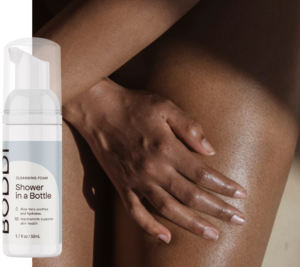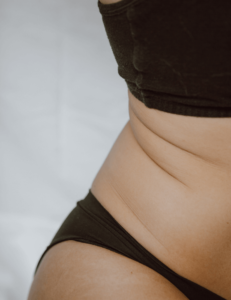Body odor is more than a hygiene issue. It’s greatly influenced by genetics, health status, and lifestyle factors. BODDI™ no-rinse cleanser can help treat and prevent body odor while also promoting skin health—here’s why.
By: *Jennifer Fisher
Body odor, in many ways, is the great human equalizer. After a tough workout or hectic day, we've all been there—caught a whiff of an unexpected, not-so-pleasant scent, only to realize it's coming from us. Body odor, a universal experience, is often unfairly linked to poor hygiene, impacting our day-to-day lives. Let's break the stigma and explore how addressing body odor can enhance quality of life. But why exactly does body odor occur? And is there any way to prevent it?

What causes body odor?
Sweat and bacteria on the skin cause body odor. Sweat itself when secreted is odorless. Bacteria on the skin surface metabolize sweat, resulting in the production of odor. While most parts of the body can sweat, only specific sweat glands, called apocrine glands, host bacteria that create odor. Apocrine glands are found in the underarms, around the belly button, breasts, upper lip, and anogenital areas.
Why does my body odor smell different?
Body odor differs from person to person because the bacteria on our skin, part of our natural flora or microbiota, are unique and varied. Scientists have identified certain bacterial strains that often lead to unpleasant odors. Our daily habits and genetic factors, such as gender and ethnicity, influence our unique body odor. What we eat and how we live play a part too. Foods rich in sulfur, like onions and garlic, or spicy dishes, alcohol, and caffeine, can intensify body odor. Stress, exercise, and hot weather make us sweat more, while our hygiene habits affect the amount of sweat and bacteria lingering on our skin. Medical factors, such as certain medications or conditions like hyperhidrosis, can also make us more prone to body odor. Surprisingly, the continuous use of antiperspirants might actually increase bacteria in the underarms, making body odor worse. That's why it's crucial to focus on good hygiene practices, not just relying on antiperspirants alone, to keep body odor in check.
What are the ways to treat and prevent body odor?

The first consideration should be to control sweating in sensitive areas. Opt for fabrics like cotton that are loose, moisture-wicking, or breathable—they can assist in regulating temperature and reducing sweating. Keeping body hair trim in odor-producing areas of the body such as the underarms can also be helpful. This is because sweat and bacteria can become trapped in body hair leading to odor.
For many, the go-to solution for body odor is the application of deodorants or antiperspirants, often used together. They control localized sweating and odor. Antiperspirants tackle the issue by reducing sweat production, while deodorants contain ingredients that eliminate or hinder bacteria reproduction on the skin. These products work hand-in-hand to prevent and mask body odor. However, their effectiveness is limited as the active ingredients are eventually absorbed or break down on the skin over time.
The best and most effective way to treat and prevent body odor is to keep the odor-producing areas of the body properly cleansed, clean, and dry. Thorough washing once or twice a day with soap and water in the shower is often sufficient. Yet, for those leading active lives—be it busy parents, healthcare workers, frequent travelers, or anyone juggling a packed schedule—committing to multiple showers a day isn't always a feasible choice. BODDI™ provides an easier and more convenient way to cleanse the skin of sweat, dirt, and bacteria to treat and prevent body odor. You can apply the no-rinse foam solution to dry skin, offering an alternative for when you're on-the-go or between showers.
Are deodorants and antiperspirants safe?
Traditional antiperspirants and deodorants usually contain two main chemical compounds: aluminum salts and triclosan. Aluminum salts reduce sweat by blocking sweat glands mechanically. Triclosan acts as a broad-spectrum antibacterial agent to get rid of odor-causing bacteria. While triclosan is currently deemed safe for humans with no reported toxicity, there are environmental concerns due to evidence of its accumulation, raising potential issues for ecological damage.1
Research has suggested a potential link between aluminum and breast cancer, pointing to its impact on estrogen signaling. Additionally, aluminum toxicity has been associated with conditions like dementia and various bone and blood disorders. While the absorption of aluminum through underarm sweat glands and hair follicles is minimal, with most naturally eliminated through urine, the continuous exposure risk remains unclear. It's crucial to note that there is no confirmed direct link between antiperspirants containing aluminum and chronic health issues.
Despite experts generally acknowledging the safety of traditional antiperspirants and deodorants, there's a growing consumer interest in natural and sustainable personal care products. Essential oils, such as tea tree oil and plant-based compounds like witch hazel, not only provide natural fragrances but offer antimicrobial benefits.

Considering skin soothing and hydrating ingredients is crucial. Areas prone to odor production face an increased risk of skin irritation due to sweating, friction, and shaving. Harsh chemicals like aluminum chloride and fragrances may result in skin rashes and even allergic contact dermatitis. While traditional cleansing products, such as bar soap, remove dirt, sweat, and bacteria, they can be harsh and drying for sensitive skin. Opting for products like BODDI™, enriched with ingredients such as aloe vera, niacinamide, and glycerin, ensures a skin-soothing and hydrating effect.
When to consult a doctor
If lifestyle changes and hygiene methods don't improve your body odor or sweating, consult a board-certified Dermatologist, Dermatology Physician Assistant, or Nurse Practitioner. Discuss advanced treatments like botulinum toxin injections, therapeutic laser treatments, prescription medications, or surgery with a medical provider. Medical evaluation is essential for changes in the smell of your body odor, such as a sweet, fruity scent or an ammonia-like smell, as they may indicate an underlying medical condition.
The information provided in this blog is for general informational purposes only and should not be considered medical advice. Please refer to the Privacy Policy for details on website practices, disclaimers, and disclosures.
BODDI products are formulated for a wide range of skin types, but everyone’s skin is unique. We recommend performing a patch test before full use. If irritation occurs, discontinue use immediately.
For the most accurate and up-to-date information about BODDI products, please visit boddiskin.com.
*Jennifer Fisher, MMSc, PA-C is a medical writer, and Dermatology Physician Assistant who completed her training at Tufts University School of Medicine.
- Oliveira ECVd, Salvador DS, Holsback V, Shultz JD, Michniak-Kohn BB, Leonardi GR. Deodorants and antiperspirants: identification of new strategies and perspectives to prevent and control malodor and sweat of the body. International Journal of Dermatology. 2021;60(5):613-619. doi:https://doi.org/10.1111/ijd.15418


